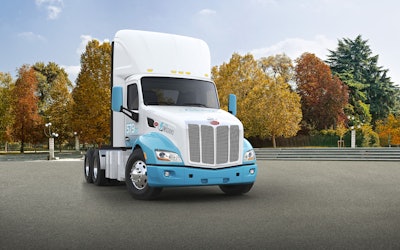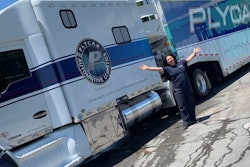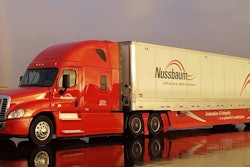Trucking news and briefs for Tuesday, Feb. 4, 2020:
 Meritor will supply the electric powertrains for Peterbilt’s heavy-duty electric trucks, including the 579EV, pictured here.
Meritor will supply the electric powertrains for Peterbilt’s heavy-duty electric trucks, including the 579EV, pictured here.Peterbilt picks Meritor to supply powertrains for electric trucks
Peterbilt announced this week it has reached an agreement to make Meritor the non-exclusive supplier of electric powertrains for the company’s heavy-duty models 579EV and 520EV battery-powered electric trucks.
“With this announcement, we have locked in suppliers for all of our battery-electric model configurations,” said Jason Skoog, Paccar vice president and Peterbilt general manager.
Peterbilt says low volume production for the Model 579EV will begin in late 2020, followed by the Model 520EV in 2021.
Utah trucking company owners ordered to forfeit over $1 million
Jay and Garrett Barber, the former owners of Reliable Transportation Services, were ordered by a U.S. District Court in Utah to forfeit nearly $1.5 million for their roles in a wire fraud scheme. Jay Barber was ordered to forfeit $403,941.70, and Garrett Barber was ordered to forfeit $920,457.30.
The Department of Transportation Office of Inspector General says the forfeiture amounts were determined to be the proceeds of a wire fraud scheme organized by the brothers. Both had previously pleaded guilty and were sentenced to conspiracy to defraud the United States and commit wire fraud.
A prior indictment alleged that the Barbers evaded enforcement of motor carrier safety regulations.
Freight-data platform now using data to identify headhaul/backhaul carriers
The Cargo Chief C4 carrier management platform for brokers says it is now sorting carriers’ lanes by what it’s calling “headhaul” and “backhaul” options, dependent in part on that carrier’s central place of business and known route history. C4, the company adds, determines carrier lane preferences by giving any-size brokerage ways to see where, when, and how often a carrier runs a given lane. C4 also aggregates a broker’s existing carriers and out-of-network carriers to provide a complete view of available capacity for their next load.
Myriad sources of carriers’ location data are used for this purpose — see our prior reporting on that front via this link, including ways to opt in to what is essentially on its way to becoming a multi-broker freight engine for carriers who work with any intermediary on the platform or wish to market themselves to those brokers. Be aware, however, that Cargo Chief markets the new sorting options as a way to prioritize a broker’s choices for any given load to increase efficiency, reducing the need to rely on a carrier’s history and/or call-ins for posted loads. While that could help to provide a broker with an “effective outbound and proactive approach to build carrier relationships for the long-term,” as Cargo Chief puts in their press release on the new tools, John Andreotti, COO of Trek Freight Services LLC puts the value he sees another way: “Our experience from booking hundreds of thousands of loads over the years is that a backhaul carrier could save us 5% to 15% on the cost to cover a load. Finding backhaul carriers definitely increases our margins.”









